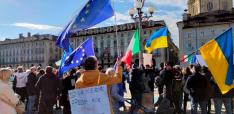Georgia in the Russo-Ukrainian war: balancing between West, Russia and China

Tato Khundadze and Robert H. Wade explore why Georgia must avoid becoming a pawn of any major power.
Tiny Georgia is a crucible of East-West and regional tensions. In the months after Russia’s invasion of Ukraine the US and European governments pressed Georgia (population 3.7mn) to open a second front against Russia (population 142mn). When the government refused, western sources denigrated it as “pro Russia”, and several leaders became subject to sanctions. What lay behind the western pressure and the Georgian government’s response?
After Russia’s 2022 invasion of Ukraine Georgian officials alleged that the Biden administration, the EU, and Ukrainian officials pressured the Georgian Dream-led government to open a second front against Russia in support of Ukraine - the second front being a way to “extend Russia” and divert some of its forces away from Ukraine. (Georgia is not a NATO member, and borders Russia to the north.) This pressure was not applied publicly but has been described by high-ranking officials, including Georgia’s current president, prime minister, and Bidzina.
Bidzina is the popular name of Bidzina Ivanishvilli. He is a dollar billionaire, with assets derived from activities in the wild west days of Russia’s 1990s implosion. Unlike other Russia-made billionaires, he has invested heavily in providing public goods in Georgia, where he lives—such as building and rehabilitating 400 secondary schools, reconstructing 11 theaters and 9 museums, and establishing Kutaisi International University. He is said to be the “power behind the throne” of the Georgian Dream party. The Economist magazine recently declared him to be “the shadowy despot” of Georgia (2025).
Bidzina has stated publicly that the US put him under indirect sanctions before Russia’s invasion of Ukraine, freezing his assets in Switzerland. On December 27, 2024, the U.S. officially sanctioned him, for “undermining the democratic and Euro-Atlantic future of Georgia for the benefit of the Russian Federation.”
Current and former Georgian Dream officials allege that, during a conversation with the prime minister following Russia’s invasion of Ukraine, U.S. Ambassador to Georgia Kelly C. Degnan hinted that the Georgian military should open a second front against Russia and that the U.S. would supply arms through Georgia’s border with Turkey, a NATO member. The suggested course of action was guerrilla warfare as the mode of resistance. That would keep a sizable number of Russian troops away from Ukraine, given Georgia borders with the North Caucasus (including Chechnya and Dagestan), the most troublesome region of Russia.
The Ukrainian authorities also called for Georgia to open a second front. Specifically, former Secretary of Ukraine's National Security and Defense Council, Oleksiy Danilov, and former advisor to the Ukrainian President’s Office, Aleksei Arestovich, publicly urged the Georgian government to retake Georgia’s breakaway regions by force.
Georgia has two breakaway provinces, Abkhazia and South Ossetia, where Russia has military forces. In August 2008, when Georgian forces attacked Russian forces, the ceasefire a few days later went with Russia recognizing the two breakaway provinces as independent states – which therefore had the sovereign right to invite Russian forces to be stationed there. Russian forces in South Ossetia are only 40 kms from the capital Tbilisi. In the war of 2008, Russian forces advanced to within 10 kms of Tbilisi before the ceasefire was declared. The proximity of Russian troops is largely ignored in western commentary on Georgia’s situation.
In the Russo-Ukraine war of 2022 and continuing, the Georgian opposition, while not supporting a second front, pressed the government to send weapons and volunteer soldiers to directly assist the Ukrainian army. The European Parliament, coordinating with the Georgian opposition, has approved six long resolutions condemning “the illegitimate regime of ‘Georgian Dream’” for “democratic backsliding”. Some have demanded that Georgia impose sanctions on Russia, reduce its trade with Russia and curb the influx of Russian citizens. The most recent, in February 2025, called on the European Council and member states to impose sanctions on senior officials of the Georgian Dream party, and on judges who issue politically motivated rulings, as well as law enforcement officers, financial enablers, and media which support the regime.
The Georgian government pushed back against this concerted western pressure, not wanting to provoke Moscow’s hostility in the context of Georgia’s vulnerability to Russian aggression (troops only 40km from the capital) and its economic dependence on Russia. Georgia includes Russia as one of its top five export destinations; the biggest source of tourists; and third biggest source of remittances.
The economic dependence on Russia is all the more crucial now because Georgia is in economic crisis, despite an official growth rate of 11% in 2024. The official unemployment rate is around 14%. A broader measure of “labour underutilization” counts almost a third of the population as underutilized. Outward migration is high.
After the start of the Russo-Ukraine war several Georgian NGOs organized waves of demonstrations in Freedom Square outside parliament, continuing till today. The demonstrations have been against the government and in support of US and EU demands – including sanctions against Russia, end of visa free travel with Russia, and support for volunteers to fight with the Ukrainian army. Another target was the government’s passing of the Law on Transparency of Foreign Influence (known informally as the “foreign agents” bill), requiring NGOs to reveal their sources of funding and the scope of their activities. Protestors claimed the law mirrored a Russian law and was evidence of the pro-Russia stance of the Georgian Dream government. Ironically, these NGOs have been receiving large funding through USAID but have declined to reveal the sources of their funds or the range of their activities. They are reliable supporters of parties opposed to the Georgian Dream government.
The latest protests in Tbilisi are driven by opposition claims of falsification of the October 2024 parliamentary elections and Georgia's (alleged) abandonment of its European path in favor of closer ties with Russia. The Economist report from early February 2025 says “The drama has been sustained for more than two months now…. Every night people block the square and Tbilisi’s main artery …. On February 3rd there was an extra-big protest. The police responded with their trademark violence, beating demonstrators and detaining several activists and two opposition leaders”.
The “pro Russia” accusation ignores the long history of post-Soviet Union Georgia, including the Georgian Dream party, identifying with the West and being loyal to the US, as in supporting the US position on Ukraine in the UN General Assembly, supporting the Ukraine reports of the OSCE (Organization for Security and Cooperation in Europe), and more. The Georgian Dream government says that it remains committed to joining the EU and NATO, eventually. It emphasises that under its leadership the constitution was amended to include integration to the EU and NATO as objectives for future governments; and further emphasises that during the current government’s tenure it signed an Association Agreement with the EU and secured visa-free access to Europe.
Georgia has actively supported Ukraine since the war began, backing over 600 international resolutions and initiatives, and strictly monitoring sanctioned individuals and cargo in coordination with the EU, UK, and US. The government has provided over 1,000 tons of humanitarian aid worth around $12.5mn. The 26,000 Ukrainians who fled to Georgia after 2022 have received the same financial aid as Georgian refugees from the two Russian-occupied provinces. Over 2,300 Ukrainian students are enrolled in Georgia’s education system, following the Ukrainian curriculum.
The US and the EU have been pressing the Georgian government to take actions which expose the country to the danger of a Russian attack and continuing tighter control. The aims have been to divert Russian resources from Ukraine, and more broadly to disrupt Russia’s relations with regional big powers, notably Turkey, Iran and China. As the chairman of the Georgian parliament wrote in response to the Baltic governments’ calling for sanctions on Georgian officials for “democratic backsliding”, “The Baltic political elites are only our friends as long as we are willing to abandon self-preservation and blow ourselves up like a landmine to harm Russia and shield the Baltics from danger.” He added a chart of Georgia’s and the three Baltics’ troop contributions to NATO’s Resolute Support Mission to Afghanistan 2015-2021. Georgia contributed 7 times the number of the combined Baltics, whose population of 6mn is 60% bigger than Georgia’s 3.7mn.
It is important that western states avoid inflaming the acute economic and security dilemmas faced by the government. The government knows full well – and the protestors should know full well – that NATO will not accept Georgia as a member for at least as long as two pieces of its territory are occupied by Russia and claim to be independent states. Having another Kiev Maidan conflagration in Tbilisi- with western actors on the ground encouraging mobilization against the government- is not in the interests of Europe or the United States. It could provide Russia with a pretext for exerting more control. It would worsen the already serious economic problems.
The US and the EU have been treating Georgia as though it is, or should be, a western pawn, in the spirit of “realist” international relations theory. Given the hard fact of Georgia’s location, the government has to avoid becoming a pawn of any major power, whether the US, EU, Russia, or China. It has to resist the West’s attempt to impose a Manichean choice between “good West” and “bad Russia”, and build on Georgia’s status as a “connector country” looking both West and East. It has to implement an industrialization strategy to boost the ability of producers in Georgia, including foreign investors, to exploit the advantages of connector country.
Tato Khundadze is a PhD candidate at the New School, New York City;
Robert H. Wade is professor of global political economy at the London School of Economics.
Address for correspondence: Khundadze, (khunt758@newschool.edu)
Photo by Victor Freitas


